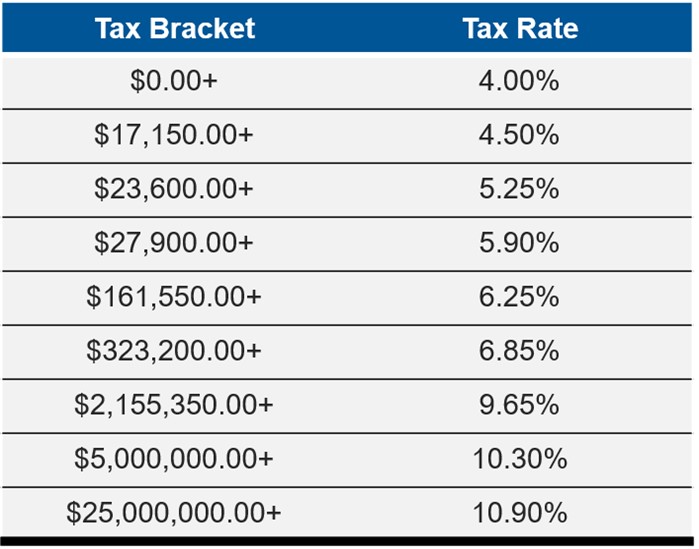Income tax rates in New York State play a significant role in shaping the financial landscape for both residents and businesses. Whether you're an individual taxpayer or a company operating within the state, understanding how these rates work is crucial for effective financial planning. New York State has a progressive tax system, meaning that higher income levels are taxed at higher rates, and this structure can significantly impact your overall tax liability.
With the ever-changing tax laws and regulations, staying informed about the latest updates on income tax rates in New York State is essential. This guide aims to provide you with a detailed breakdown of the tax brackets, exemptions, deductions, and other critical factors that influence your tax obligations. By the end of this article, you'll have a clearer understanding of how to navigate the complexities of New York's income tax system.
This article will also delve into strategies for minimizing your tax burden, including tips on leveraging deductions and credits. Whether you're a resident, a small business owner, or an investor, this information will prove invaluable in helping you make informed decisions about your finances.
Read also:Remote Connect Iot Over Internet A Comprehensive Guide
Table of Contents
- Overview of New York State Income Tax Rates
- New York State Income Tax Brackets
- Filing Status and Its Impact on Taxes
- Deductions and Credits for NYS Residents
- Income Tax for Businesses in New York State
- Tax Exemptions and Allowances
- Federal vs. State Income Taxes
- The Filing Process for NYS Taxes
- Penalties for Late or Incorrect Filings
- Future Changes in NYS Income Tax Rates
Overview of New York State Income Tax Rates
New York State income tax rates are designed to ensure that individuals and businesses contribute fairly to the state's revenue. The tax system is progressive, meaning that as your income increases, so does the percentage of tax you pay. This structure aims to balance the financial burden across different income levels.
In 2023, New York State introduced several updates to its tax brackets and rates, which have been adjusted for inflation. These changes affect both individual filers and businesses operating within the state. Understanding these updates is crucial for planning your finances effectively and ensuring compliance with state regulations.
Key Features of NYS Income Tax
- Progressive tax system with multiple brackets
- Varied rates depending on income level and filing status
- Availability of deductions and credits to reduce taxable income
New York State Income Tax Brackets
The income tax brackets in New York State are structured to reflect the progressive nature of the tax system. As of 2023, the tax rates range from 4% for the lowest income bracket to 10.9% for the highest. These brackets are updated annually to account for inflation, ensuring that the system remains fair and equitable.
Tax Bracket Breakdown
Below is a detailed breakdown of the tax brackets for single filers in New York State:
- 4% for income up to $8,600
- 4.5% for income between $8,601 and $11,950
- 5.25% for income between $11,951 and $24,100
- 5.97% for income between $24,101 and $209,600
- 6.23% for income between $209,601 and $1,077,550
- 8.82% for income between $1,077,551 and $2,155,100
- 10.30% for income between $2,155,101 and $5,000,000
- 10.90% for income above $5,000,001
Filing Status and Its Impact on Taxes
Your filing status plays a crucial role in determining your tax liability in New York State. Whether you file as a single individual, married filing jointly, married filing separately, or head of household, each status has its own set of tax brackets and deductions.
Comparison of Filing Statuses
For instance, married couples filing jointly may benefit from higher income thresholds before reaching higher tax brackets compared to single filers. Understanding these differences can help you optimize your tax strategy and potentially reduce your overall tax burden.
Read also:Misaka X A Comprehensive Guide To Understanding Its Features And Applications
Deductions and Credits for NYS Residents
New York State offers a variety of deductions and credits to help residents lower their taxable income. These include standard deductions, itemized deductions, and various credits such as the Earned Income Tax Credit (EITC) and Child Tax Credit.
Popular Deductions and Credits
- Standard deduction: $8,600 for single filers, $17,200 for married filing jointly
- Itemized deductions: Includes mortgage interest, charitable contributions, and state/local taxes
- Earned Income Tax Credit: Provides financial assistance to low- to moderate-income workers
- Child Tax Credit: Offers up to $2,000 per qualifying child
Income Tax for Businesses in New York State
Businesses operating in New York State are also subject to income tax, with rates varying depending on the type of business entity. Corporations, partnerships, and sole proprietorships each have their own tax obligations and filing requirements.
Corporate Tax Rates
As of 2023, the corporate income tax rate in New York State is 6.5%. However, certain industries and businesses may qualify for tax incentives or credits, which can significantly reduce their tax liability.
Tax Exemptions and Allowances
Some individuals and businesses may qualify for tax exemptions or allowances, reducing their overall tax burden. These exemptions are often based on specific criteria, such as age, disability, or military service.
Examples of Tax Exemptions
- Senior citizen exemptions
- Disability exemptions
- Military service exemptions
Federal vs. State Income Taxes
While federal and state income taxes share some similarities, there are key differences that taxpayers should be aware of. Understanding these differences can help you better manage your overall tax obligations.
Key Differences
For example, New York State allows itemized deductions for state and local taxes, whereas federal tax law imposes a cap on such deductions. Additionally, New York State offers certain credits and exemptions that are not available at the federal level.
The Filing Process for NYS Taxes
Filing your income tax return in New York State can be done either electronically or through paper forms. The state encourages electronic filing for its convenience and accuracy. Deadlines for filing are typically set for April 15th each year, with extensions available upon request.
Tips for Smooth Filing
- Gather all necessary documents, such as W-2s and 1099s
- Use tax software or consult a professional for assistance
- Submit your return early to avoid last-minute stress
Penalties for Late or Incorrect Filings
Failing to file your income tax return on time or submitting incorrect information can result in penalties and interest charges. It's essential to understand these consequences to avoid unnecessary financial burdens.
Common Penalties
- Failure-to-file penalty: 5% of unpaid taxes per month, up to 25%
- Failure-to-pay penalty: 0.5% of unpaid taxes per month
- Interest charges: Applied to unpaid taxes at the current rate
Future Changes in NYS Income Tax Rates
As tax laws continue to evolve, it's important to stay informed about potential changes to New York State income tax rates. Legislative updates and economic factors can influence these changes, impacting both individuals and businesses.
Staying Updated
Regularly checking official state resources and consulting with tax professionals can help you remain prepared for any changes. This proactive approach ensures that you're always ready to adapt to new regulations and requirements.
Conclusion
In summary, understanding income tax rates in New York State is essential for effective financial planning. By familiarizing yourself with the tax brackets, deductions, credits, and filing processes, you can better manage your tax obligations and reduce your overall tax burden.
We encourage you to share this article with others who may find it helpful and to explore additional resources on our website for more insights into personal finance and tax management. If you have any questions or feedback, please leave a comment below. Together, let's make informed financial decisions for a brighter future!


